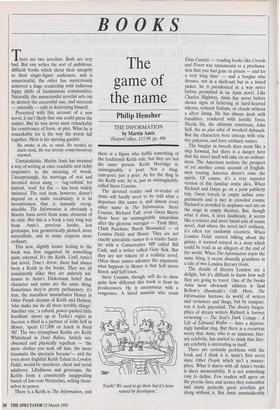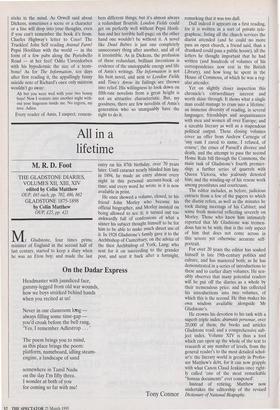BOOKS
The game of the name
Philip Hensher
THE INFORMATION by Martin Amis HarperCollins, £15.99, pp. 496 There are two novelists. Both are very bad. But one writes the sort of ambitious, difficult books which shout their integrity to their single-figure audiences, and is unsuccessful; the other has mysteriously achieved a huge readership with ludicrous hippy idylls of harmonious communities. Naturally, the unsuccessful novelist sets out to destroy the successful one, and succeeds — naturally — only in destroying himself.
Presented with this account of a new novel, it isn't likely that one could guess the author. But he was never most remarkable for contrivance of form, or plot. What he is remarkable for is the way the words fall together. Here is his opening gambit:
He awoke at six, as usual. He needed no alarm clock. He was already comprehensively alarmed.
Unmistakable. Martin Amis has invented a way of writing at once readable and richly responsive to the meaning of words. Unsurprisingly, his marriage of real and invented street slang — 'rug-rethink' for haircut, 'sock' for flat — has been widely imitated. The real item, however, doesn't depend on a static vocabulary; it is its inventiveness that is instantly recog- niseable. The Information is obviously a Martin Amis novel from some elements of its style. But this is a book a very long way from Amis's previous books; less grotesque, less geometrically plotted, more naturalistic, and in some respects more ordinary.
This new, slightly looser feeling to the book was first suggested by something quite external. It's the Keith. Until Amis's last novel, Time's Arrow, there had always been a Keith in the books. They are all consistently alike; they are unlovely wit- nesses to Amis's Dickensian belief that character and name are the same thing. Sometimes they're pretty perfunctory, it's true; the marathon masturbator Honey in Other People dreams of Keith and Helmut, `who make me do all these terrible things'. Another one, 'a cuboid, power-packed little hoodlum' shows up at Torka's orgies in Success; a third is a partner of John Self in Money, 'spent £17,000 on lunch in fiscal `80'. The two triumphant Keiths are Keith Whitehead in Dead Babies, futilely sex- obsessed and physically repellent — 'the more clothes you took off him, the more traumatic the spectacle became'— and the even more frightful Keith Talent in London Fields, would-be murderer, cheat and serial adulterer. Libidinous and grotesque, the Keiths form a consistently unappealing bunch of low-rent Nietzsches, willing them- selves to power.
There is a Keith in The Information, and there is a figure who fulfils something of the traditional Keith role; but they are not the same person. Keith Horridge is, unimaginably, a poet. Not a thug- cum-poet; just a poet. As for the thug in the Keith role, he is, just as unimaginably, called Steve Cousins The devoted reader and re-reader of Amis will hardly need to be told what a departure this name is, and almost every other name in The Information. Steve Cousins, Richard Tull, even Gwyn Barry; these have an unimaginable naturalism after the glorious outrages — Trish Shirt, Chick Purchase, Burch Beausoleil — of London Fields and Money. They are not exactly unrealistic names to a reader famil- iar with a Conservative MP called Bill Cash, and a writer called Gary Sick. But they are not tokens of a realistic novel. Often these names advance the argument; what happens in Money is that Self meets Street, and Self loses.
Steve Cousins, though, will do to show quite how different this book is from its predecessors. He is anonymous with a vengeance. A hired assassin who reads Earth? We used to go there but it's been ruined by developers.' Elias Canetti — 'reading books like Crowds and Power was tantamount to a proclama- tion that you had gone to prison — and for a very long time' — and a burglar who dresses, not in a shell-suit but in a tweed jacket, he is paradoxical in a way never before permitted in an Amis novel. Like Charles Highway, Amis has never before shown signs of believing in hard-hearted whores, reticent Italians, or clouds without a silver lining. He has always dealt with banalities, rendered with terrific force; Nicola Six, the ultimate courtesan, John Self, the ne plus ultra of wrecked debauch. But the characters here emerge with rela- tive paleness, and have ordinary names.
The burglar in tweeds does seem like a step forward, but there is a danger here that the novel itself will take on an ordinar- iness. The American section; the prospect of yet another comic account of English- men touring America doesn't raise the spirits. Of course, it's a very superior version of this familiar comic idea. When Richard and Gwyn go on a joint publicity trip, Gwyn travels in empty airline com- partments and is met in crowded rooms; Richard is crowded in airplanes and sits on the stage in empty theatres. But, though what it does, it does faultlessly, it seems like a coarser and more banal sort of comic novel. And where the novel isn't ordinary, it's often too randomly eccentric. When London Fields started talking about the galaxy, it seemed natural in a story which could be read as an allegory of the end of the world. When The Information starts the same thing, it seems absurdly grandiose in a tale of two London literary rivals.
The details of literary London are a delight, but it's difficult to know how well they are going to travel. One of the books Amis most obviously admires is Saul Bellow's Humboldt's Gift. Here, The Information borrows its world of writers and reviewers and thugs, but by compari- son it feels parochial. The dreary biogra- phies of dreary writers Richard is forever reviewing — The Soul's Dark Cottage : A Life of Edmund Waller — have a depress- ingly familiar ring. But there is a recurrent worry that Amis, who is an immense liter- ary celebrity, has started to think that liter- ary celebrity is interesting in itself.
There are certainly problems with the book and I think it is Amis's first novel since Other People which isn't a master- piece. What it shares with all Amis's books is sheer memorability. It is not something easy to define. Few readers will agree on the precise lines and scenes they remember and many perfectly good novelists get along without it. But Amis unmistakeably sticks in the mind. As Orwell said about Dickens, sometimes a scene or a character or a line will drop into your thoughts, even if you can't remember the book it's from. Charles Highway's letter to Coco! The Truckles! John Self reading Animal Farm! Pepsi Hoolihan with the world — in the form of a few pubs along the Portobello Road — at her feet! Odilo Unverdorben with his hypodermic the size of a trom- bone! As for The Information, ten days after first reading it, the appallingly funny suicide note of Richard's once only mistress wouldn't go away: Ah but you were wed with your two bonny boys! Now I venture into another night with- out your hugeness inside me. No regrets, my love. Adieu.
Every reader of Amis, I suspect, remem- bers different things; but it's almost always a redundant flourish. London Fields could get on perfectly well without Pepsi Hooli- han and her terrible half-page; on the other hand one wouldn't be without it. A novel like Dead Babies is just one completely unnecessary thing after another, and all of it irresistible. As in Dickens, the profusion of these redundant, brilliant inventions is evidence of the unstoppable energy and life of Amis's writings. The Information is not his best novel, and next to London Fields and Time's Arrow its failings are thrown into relief. His willingness to look down on fifth-rate novelists from a great height is not an attractive characteristic. But, my goodness, there are few novelists of Amis's generation who so unarguably have the right to do it.



























































 Previous page
Previous page